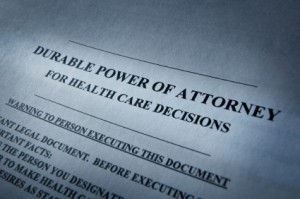Why Everyone Should Have a Power of Attorney

A Power of Attorney is a written document in which a competent adult individual (the “principal”) appoints another competent adult individual (the “agent”) to act on the principal’s behalf. In general, an agent may perform any legal function or task that the principal has a legal right to do for him or herself. You may wish to sign a Power of Attorney to give your spouse, children, or partner the power to handle your affairs if you become ill or disabled.
A Power of Attorney is an important part of estate planning because it gives one or more persons the power to act on your behalf if you become incapacitated. The power may be limited to a particular activity such as the sale of your home, or general in its application, empowering one or more persons to act on your behalf in a variety of situations. It may take effect immediately or only on the occurrence of a future event. The latter are “springing” powers of attorney. It may give temporary or continuous, permanent authority to act on your behalf. A Power of Attorney may be revoked, but Pennsylvania requires written notice of revocation to the person named to act for you.
The term “durable” in reference to a Power of Attorney means that the power remains in force for the lifetime of the principal, even if he or she becomes mentally incapacitated. The Power of Attorney can be effective immediately on signing or only on disability. A principal may cancel a Power of Attorney at any time for any reason. Powers granted in a Power of Attorney document can be very broad or very narrow in accordance with the needs of the principal. A durable Power of Attorney stays in effect even if someone becomes disabled.
Every adult has day-to-day affairs to manage, such as paying the bills. Many people are under the impression that, in the event of catastrophic illness or injury, a spouse or child can automatically act for them. Unfortunately, this is wrong, even when joint ownership situations exist. A Power of Attorney allows your partner or another person to administer your assets during your lifetime, either on disability or now.
With a valid Power of Attorney, your agent can take any action permitted in the document. Often your agent must present the actual document to invoke the power. For example, if another person is acting on your behalf to sell an automobile, the motor vehicles department generally will require that the Power of Attorney be presented before your agent’s authority to sign the title will be honored. Similarly, an agent who signs documents to buy or sell real property on your behalf must present the Power of Attorney to the title company. The same applies to sale of securities or opening and closing bank accounts.
What if you become incapacitated and do not have a Power of Attorney?
The lack of a properly prepared and executed Power of Attorney can cause extreme difficulties when an individual is stricken with severe illness or injury rendering him or her unable to make decisions or manage financial and medical affairs. In Pennsylvania you must follow the legal procedure to be appointed as a guardian. This means involvement of lawyers to prepare and file the guardianship petition and doctors to provide medical expert testimony regarding the mental incapacity of the subject of the action. The procedures also require the involvement of a temporary guardian to investigate, even intercede, in surrogate proceedings. This can be slow, costly, and very frustrating. In addition, the domestic partner can be challenged in a guardianship by the incapacitated person’s family members.
Advance preparation of the Power of Attorney could avoid the inconvenience and expense of guardianship proceedings. This needs to be done while the principal is competent, alert, and aware of the consequences of his or her decision. Once a serious problem occurs, it is usually too late.
How Should The Agent Sign?
Assume Keith Richards appoints his wife, Patty Hanson, as his agent in a written power of attorney. Patty, as agent, must sign as follows: Patty Hanson, POA for Keith Richards. Note that Patty would sign her name in her capacity as Keith’s agent and not Keith’s name.
If you need a Power of Attorney please call Gregory J. Spadea at 610-521-0604 of the Law Offices Spadea & Associates, LLC.







